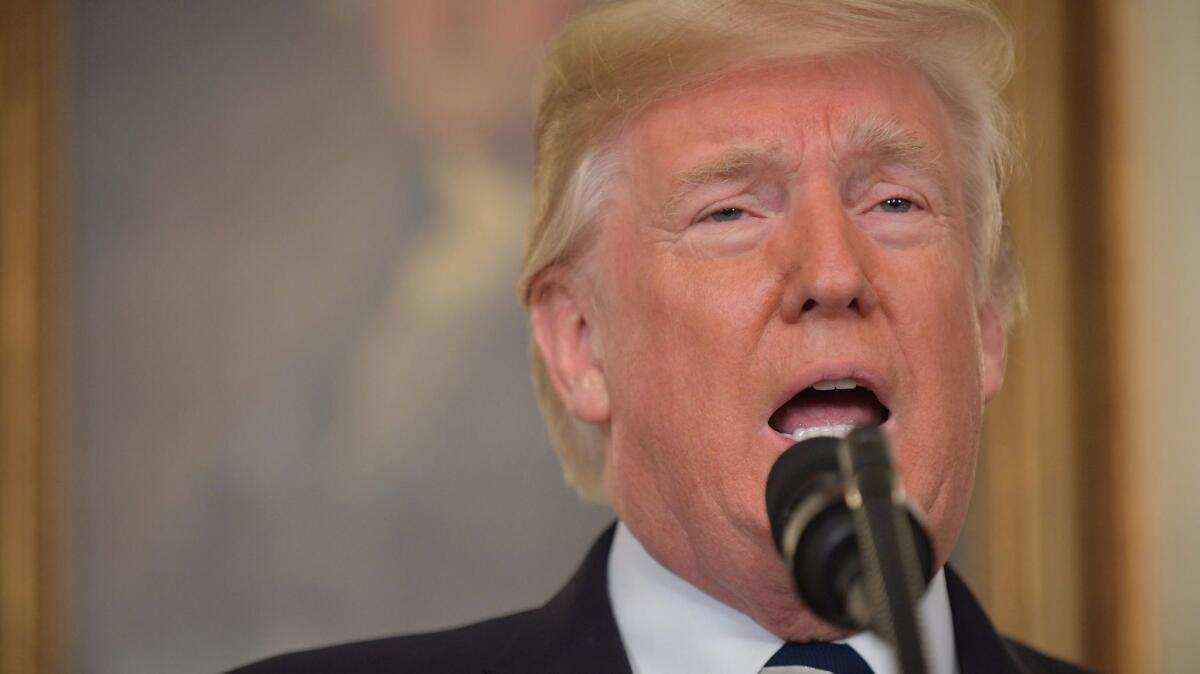Opinion: Is President Trump a ‘textbook racist’?

Good morning. I’m Paul Thornton, and it is Saturday, Oct. 7, 2017. For residents of Los Angeles (county and city), Monday is still Columbus Day; the first official Indigenous Peoples Day doesn’t happen until 2019. Let’s take a look back at the week in Opinion.
Can there be any debate that
But many of the president’s critics have been reluctant to call him a racist, a more malevolent quality that would put Trump on par with the white supremacists who marched in Charlottesville, Va. In a Los Angeles Times op-ed article, Duke University public policy professor Jay A. Pearson lays out the academic case for calling Trump a “textbook racist”:
As a professor who researches and teaches courses on the health effects of race, racism and inequality, I can assure you that the president’s defenders are wrong. Trump is a racist. What he says and does meets the scholarly definition of the term.
Broadly speaking, a racist combines negative prejudicial biases with sufficient power to leverage action against targeted groups. Trump’s words and behaviors demonstrate considerable prejudicial bias, and, as president of the United States — arguably the most powerful office in the contemporary world — he has indeed leveraged action against various groups.
Racism is predicated on belief in the scientifically discredited concept of biological race. Skin color simply has no correlation with significant inherent distinctions among human beings. However, “race” in the past and now has led to notions of a natural hierarchy among various populations. In the United States, it was used to justify stealing labor from black Africans through slavery and stealing land from red Native Americans through forced relocation and genocide....
Trump and his supporters seem to believe that simple protestations to the contrary are sufficient to refute and erase his actions. Despite these claims, some in the
Republican Party recognize the truth. Rep. Will Hurd of Texas and Sens. Lindsey Graham, Jeff Flake, John McCain and Mitch McConnell have all specifically spoken out against Trump’s worst behavior.
Las Vegas does not need your prayers. C. Moon Reed, a local journalist who attended Sunday’s music festival on the Strip but left before at least 58 people were killed and nearly 500 others were injured there that night, says Las Vegas — a city full of hospitality workers who are used to serving others — can take care of itself fine without asking God for help. But there are a few things outsiders can do, says Reed: Donate money, come for a visit, and “put to rest the ‘good guy with a gun’ narrative.” L.A. Times
Mass shootings are God’s problem, not ours.
Not hopeful much will change: “The nation awakened Monday morning to yet another pointless, blood-filled tragedy that stupefied, saddened and appalled us all,” says The Times Editorial Board. “But if history is any guide, it will not propel us to meaningful action.” In another editorial, the board says the gun industry’s drive to circumvent gun laws — such as the ban on most fully automatic weapons — allowed the Las Vegas shooter to modify his firearms with cheap accessories and effectively turn his assault rifles into machine guns.
For gun lovers who insist that Chicago proves more laws won’t work, NPR has provided a helpful fact check that should — but probably won’t — cause them to reconsider. It cites several developments over the last several years that have significantly weakened that notoriously violent city’s once-stringent gun laws, and cites California as an example of a state that has the kind of regulations cited by advocacy groups that are particularly tough and effective. NPR
There was (another) special election in Los Angeles this week, and it appears the Berniecrats will finally come out on top, writes Mariel Garza. Or maybe not, since the top two vote-getters so far for the state Assembly district that includes neighborhoods on the east side of Los Angeles have some establishment Democratic Party connections to go along with their progressive advocacy. (And by the way, preliminary turnout for that election was less than 10%.) L.A. Times
This billionaire wants Congress to raise his taxes. Tom Steyer, a California billionaire and left-wing activist, faults his fellow one-percenters for failing to see the picture on the the Republicans’ tax-reform proposal that would benefit primarily wealthy earners: “Inequality is a major crisis, yet Republicans are proposing to exacerbate it by stripping trillions more in government revenue. Indeed, the GOP plan would put the country on a path to permanent economic inequality — and maybe that’s the point.” L.A. Times
Reach me: paul.thornton@latimes.com
Get the L.A. Times Politics newsletter
Deeply reported insights into legislation, politics and policy from Sacramento, Washington and beyond. In your inbox three times per week.
You may occasionally receive promotional content from the Los Angeles Times.








